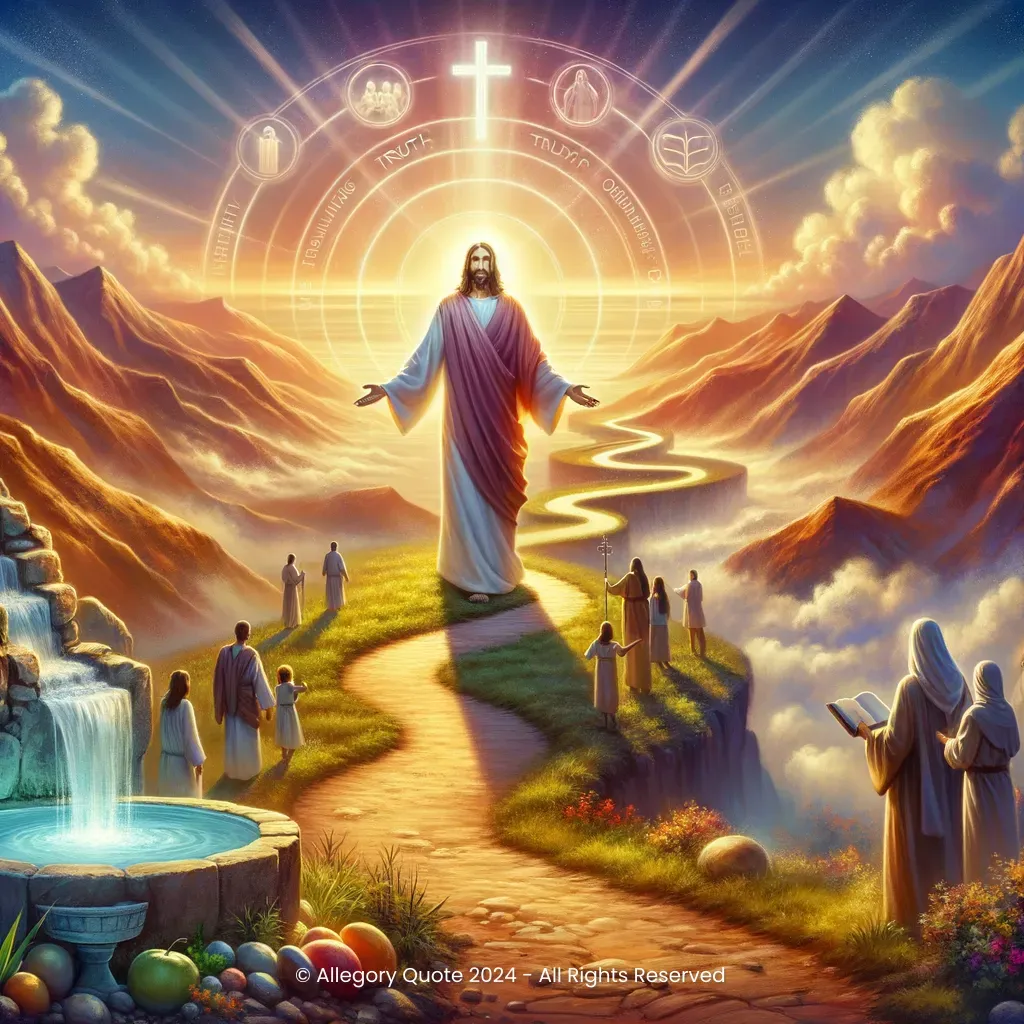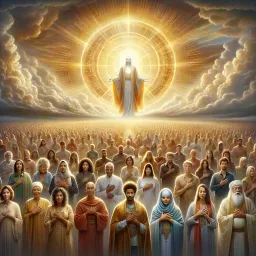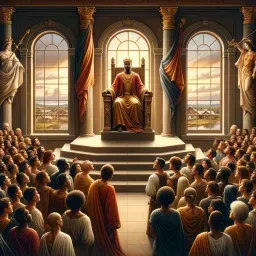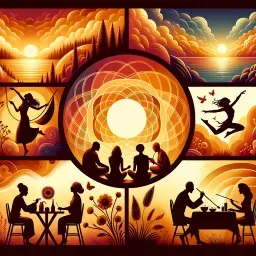”I am the way, the truth, and the life;
no one comes to the Father except through me“

0
0
0
0
- Meaning
- The phrase "I am the way, the truth, and the life; no one comes to the Father except through me" by Jesus Christ is interpreted by Christians as an assertion of His uniqueness and indispensability in salvation and reconciliation with God. In Christian theology, it represents the idea that Jesus is not just a prophet or moral teacher but the Messiah and Son of God tasked with redeeming humanity. The complete passage indicates that Jesus presents Himself as the sole mediator between God and humans, expressing the centrality of faith in Him for eternal life.
- Allegory
- The warm light illuminating the scene represents the divine presence and spiritual guidance. The central figure of Jesus Christ symbolizes "the way, the truth, and the life," with open arms in a gesture of welcome inviting everyone to follow Him. The path winding towards a bright light represents the journey of faith and salvation. Surrounding elements, such as an open book, symbolize "truth," and a clear water source represents "life." The serene people on the path illustrate the inner peace and sense of direction that come from following Jesus' teachings. The rainbow in the sky adds an element of hope, suggesting the promise of a better future through faith.
- Applicability
- The significance of this phrase can be applied to the personal lives of believers as a spiritual and moral guide. Many Christians take this statement as a foundation of their faith, encouraging them to follow Jesus' teachings to live a righteous life and achieve salvation. Additionally, by having faith that Jesus is "the way," Christians can feel guided and supported in the difficulties of daily life. In the community, it can promote unity and the fulfillment of the mission of evangelization.
- Impact
- This phrase has had a profound impact on Christian theology and religious practice. It has inspired many sermons, theological writings, and missionary movements. It is one of the most quoted statements in preaching and teaching contexts and is often used to reiterate the centrality of Christ in Christianity.
- Historical Context
- The phrase originates from the 1st century A.D. and is set during the Last Supper, a crucial gathering for Jesus' disciples before his crucifixion. This event is part of the historical and religious Jewish context of the time, where the Messiah was awaited for the liberation of the people of Israel.
- Criticisms
- The phrase has generated debates and controversies, particularly in interfaith contexts and ecumenical dialogue. Some critics see in this assertion a lack of openness toward other religious faiths, while other critics within Christianity question the exclusive interpretations of salvation through Jesus. Counterarguments vary, but many call for the importance of an inclusive and dialogical approach in interfaith relations.
- Variations
- There are interpretations of this phrase in different cultures and religions that have varying views on what it means to be a divine mediator or savior. For example, in the Islamic context, Jesus (Isa) is seen as one of the prophets, but not as the son of God. In some Eastern spirituality traditions, the concept of a unique spiritual "way" may be understood more universally and not exclusively.
-

Luck is what happens when preparation meets opportunity.
-

To live in hearts we leave behind is not to die.
-

Every tongue should confess that Jesus Christ is Lord, to the glory of God the Father.
-

I've seen things you people wouldn't believe, attack ships on fire off the shoulder of Orion, I watched c-beams glitter in the dark near the Tannhäuser Gate. All those moments will be lost in time, like tears in rain. Time to die.
-

It is better to be feared than loved, if you cannot be both.
-

It's not the years in your life that count, it's the life in your years.
-

Life is the sum of all your choices.
No Comments